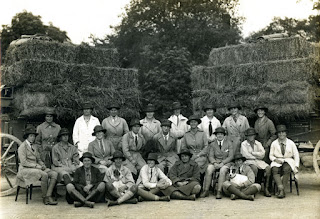Rating: ★ ☆ ☆ ☆ ☆
Obtained from: Netgalley
Read: October 5, 2015
With Britain caught up in WWI, Jack Benningham, heir to the Earl of Stonebrooke, has declared himself a conscientious objector. Instead, he secretly works for the Crown by tracking down German spies on British soil, his wild reputation and society status serving as a foolproof cover. Blinded by patriotism and concern for her brother on the front lines, wealthy suffragette Grace Mabry will do whatever it takes to assist her country's cause. When she sneaks into a posh London masquerade ball to hand out white feathers of cowardice, she never imagines the chain of events she'll set off when she hands a feather to Jack. And neither of them could anticipate the extent of the danger and betrayal that follows them--or the faith they'll need to maintain hope.
═══════════════════════════ ❧ ═══════════════════════════
 |
| Members of the Women’s Forage Corps posed in front of laden General Service Wagons. Image from the Hampshire and Solent Museums |
Heroine Grace Mabry struck me as a holier than thou, self-righteous, goody two shoes. I found her outlook exceedingly naive and couldn't credit the patriotism Breslin meant to express in her character. The spoiled socialite possesses little if any substance and her championing of the suffragette cause felt both awkward and quixotic. There is no natural correlation between Grace and the subject matter Breslin forced on her, which probably explains why the sections dedicated to Emmeline Pankhurst's movement felt strained, forced and contrived.
Jack had potential in the opening chapter, but his accident reduces him to little more than a wishy-washy, insecure, faltering mess of a human being. His emotional journey put me in mind of Archibald Craven, but I noted very little intensity and/or significance in his structure and disposition. To get right down to it, I found him dull as dishwater and I'm sorry, but I don't have time for banal, platitudinous, and/or cliché-ridden romantic heroes.
I felt the pacing tedious and the tone pretentiously didactic. I also thought the narrative grossly stereotypic and one-sided. Historically there were some interesting moments involving the Women's Forage Corps and stigmas attached to conscientious objectors during WWI, but I don't think Breslin put enough meat on the bone and I had difficulty sinking my teeth into the story she presented.
It probably goes without saying that I'd have trouble recommending Not by Sight, but I'd like to point out I'm in the extreme minority. Most have adored the title and have nothing but good things to say about it.
Jack had potential in the opening chapter, but his accident reduces him to little more than a wishy-washy, insecure, faltering mess of a human being. His emotional journey put me in mind of Archibald Craven, but I noted very little intensity and/or significance in his structure and disposition. To get right down to it, I found him dull as dishwater and I'm sorry, but I don't have time for banal, platitudinous, and/or cliché-ridden romantic heroes.
I felt the pacing tedious and the tone pretentiously didactic. I also thought the narrative grossly stereotypic and one-sided. Historically there were some interesting moments involving the Women's Forage Corps and stigmas attached to conscientious objectors during WWI, but I don't think Breslin put enough meat on the bone and I had difficulty sinking my teeth into the story she presented.
It probably goes without saying that I'd have trouble recommending Not by Sight, but I'd like to point out I'm in the extreme minority. Most have adored the title and have nothing but good things to say about it.
═══════════════════════════ ❧ ═══════════════════════════
Jack laughed, and it was a hollow sound to his own ears. “You do sound convincing, my dear. But what else could you say to persuade me, especially in my circumstances?” A pause. “I doubt you even know what love is.”
═══════════════════════════ ❧ ═══════════════════════════

No comments:
Post a Comment